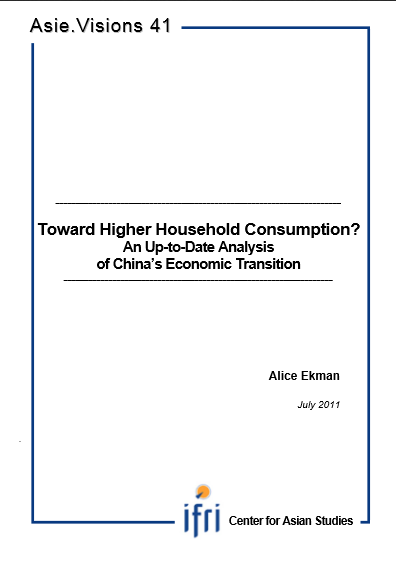Toward Higher Household Consumption? An Up-to-Date Analysis of China's Economic Transition

For more than two decades, China's economy has been growing at an average rate of close to 10 percent. As a result of this stellar performance, China ascended to the rank of the world's second largest economy in 2010, surpassing Japan.
Despite these remarkably high figures, the share of consumption in China's total expenditure has been low. China's economy relies much more heavily on exports and fixed government investments. If China continues on the same path, economic growth would not only become more vulnerable but also unsustainable.
In order to achieve sustainable growth, China needs to rebalance its economy to rely more on domestic consumers. The 12th Five-Year Plan, approved in March 2011, is designed to facilitate this shift by putting in place several large scale measures, including the improvement of the social safety net.
But transforming the nation's growth model will take time and effort. There are significant obstacles to boosting domestic consumption - such as low household income for instance - that government measures may be unable to effectively bypass.
This paper presents these current obstacles in detail and assesses the responses proposed by the 12th Five-Year Plan.

Available in:
ISBN / ISSN
Share
Download the full analysis
This page contains only a summary of our work. If you would like to have access to all the information from our research on the subject, you can download the full version in PDF format.
Toward Higher Household Consumption? An Up-to-Date Analysis of China's Economic Transition
Related centers and programs
Discover our other research centers and programsFind out more
Discover all our analysesJapan’s Takaichi Landslide: A New Face of Power
Prime Minister Sanae Takaichi has turned her exceptional popularity into a historic political victory. The snap elections of February 8 delivered an overwhelming majority for the Liberal Democratic Party (LDP), driven by strong support from young voters, drawn to her iconoclastic and dynamic image, and from conservative voters reassured by her vision of national assertiveness. This popularity lays the foundation for an ambitious strategy on both the domestic and international fronts.
The U.S. Policy Toward Taiwan Beyond Donald Trump: Mapping the American Stakeholders of U.S.-Taiwan Relations
Donald Trump’s return to the White House reintroduced acute uncertainty into the security commitment of the United States (U.S.) to Taiwan. Unlike President Joe Biden, who repeatedly stated the determination to defend Taiwan, President Trump refrains from commenting on the hypothetical U.S. response in the context of a cross-Strait crisis.

China’s Strategy Toward Pacific Island countries: Countering Taiwan and Western Influence
Over the past decade, China has deployed a diplomatic strategy toward the Pacific Island Countries (PICs). This strategy pursues two main objectives: countering Taiwan's diplomatic influence in the region and countering the influence of liberal democracies in what Beijing refers to as the "Global South."

Opening up the G7 to South Korea to Address Contemporary Global Challenges
The G7’s global influence has diminished as powers like China reshape international governance through initiatives such as BRICS and the Shanghai Cooperation Organisation (SCO). With the G7 now representing just 10 per cent of the world’s population and 28 per cent of global GDP, its relevance is increasingly questioned.










